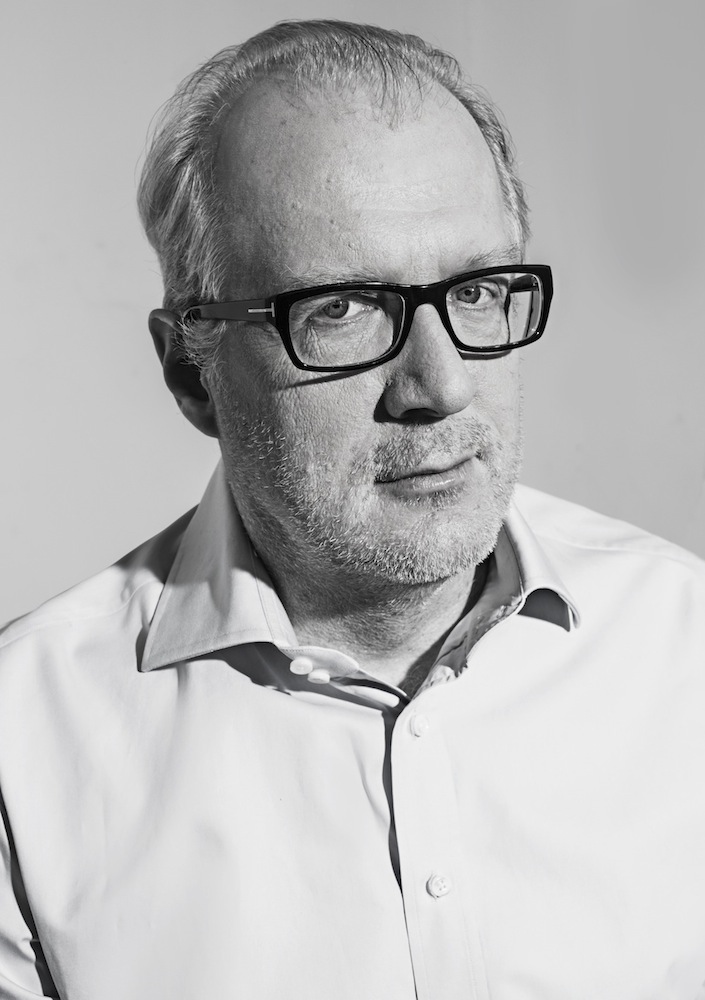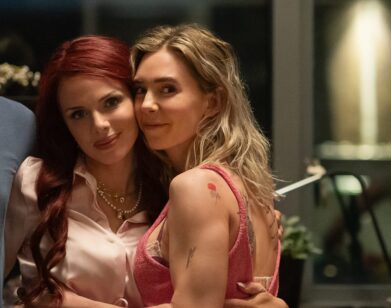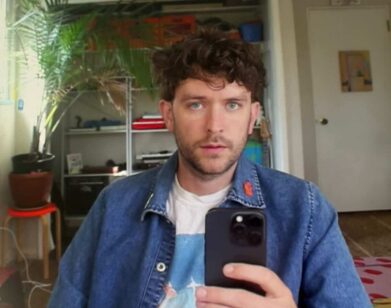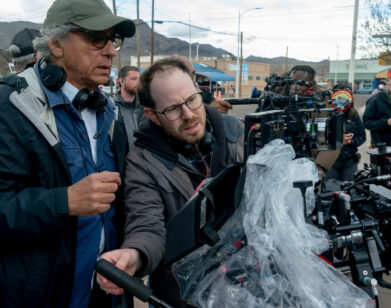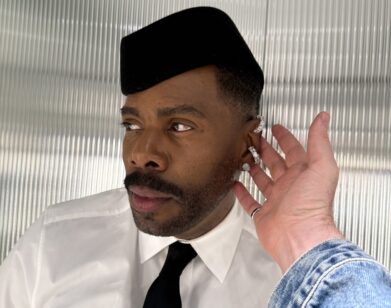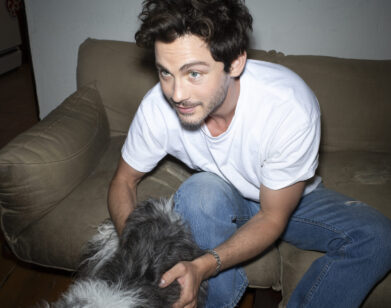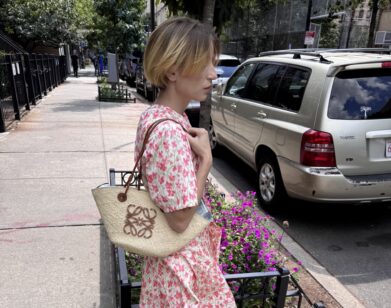Tracy Letts
PORTRAIT: VICTORIA STEVENS. STYLING: ASHLEY PRUITT. JESSI BUTTERFIELD FOR TRACEYMATTINGLY.COM.
Over the last 25-odd years, Tracy Letts has developed two distinct and distinguished careers: there is Letts the Pulitzer-winning playwright, and Letts the Tony- and SAG Award-nominated actor. “To this day, people see me on Homeland and they don’t know I’m a playwright,” the Oklahoma-native notes over brunch in New York. “I’ve never written stuff for me to act in. I have no interest in doing both at the same time.”
The last few years have been particularly fruitful for Letts on both fronts. He has penned two new plays: Linda Vista, which is currently on at the Steppenwolf in Chicago, and The Minutes, which will debut at the Steppenwolf this autumn before moving to Broadway. On Friday, The Lovers opened in New York City and Los Angeles after premiering at the Tribeca Film Festival. Written and directed by Azazel Jacob, the film is a two-hander indie comedy starring Letts and Debra Winger as a long-married couple who, in the midst of separate longstanding affairs, rediscover their passion for one another. Later this year, the 51-year-old will return to television in HBO’s Divorce and appear alongside Saoirse Ronan, Timothée Chalamet, and Lucas Hedges in Greta Gerwig’s directorial debut Lady Bird. “I met Greta at the opening party for [our film] Weiner-Dog at Sundance,” he explains. “She’d always seen me in film or TV and thought maybe I was the jerk—even in Weiner-Dog, I was the jerk,” he continues. “When she realized I was a nice guy—I fooled her—she wanted me for the role of the father in Lady Bird.”
EMMA BROWN: How did you get involved in The Lovers?
TRACY LETTS: They sent me a script and asked me to do it. It just came with an offer. I don’t know how many people before me turned it down, but you never know that, really. [laughs] I didn’t know Azazel [Jacobs] at all, but I knew Debra Winger and she was already involved. I knew A24, and am very impressed with their work. The part is not the kind of thing I get asked to do very often. It scared me. The idea that somebody was making a movie about middle-aged people experiencing love and sex and romance… middle-aged people often aren’t shown as viably sexual people, so that the script did that in and of itself was ambitious. I admired that about it. Also, I’m just not normally that high on the call sheet. Normally, I’m the character actor who’s furthering the plot along. I’ve played a lot of lead roles on-stage, but in film and TV, I’m the guy in the suit who comes in. The idea that I got to go through those heavy kinds of things is very appealing.
BROWN: If you were friends with your character, Michael, and he came to you in the middle of the narrative, what would advice would you give him?
LETTS: I don’t think I’d give advice. That never pays off. That’s always a bad idea. If they follow your advice and it doesn’t work out, or if they don’t follow your advice, somehow you’re on the hook for it. I suppose if I had a friend who was really in need, I don’t know what I’d say. “Get your shit together, man.” Or, “That sounds really interesting and perhaps exciting, but there’s a downside of living your life like that.”
BROWN: The downside is hugely obvious when you meet Michael and Mary’s son, Joel.
LETTS: Right. It’s one of the things I really like about the script; the third act of the film gets very real when you see the people who are the collateral damage of living your life like that. The son is a very real example of how people get hurt. [My wife] Carrie [Coon] watched the movie last night with me. It was the first time she’d seen it and she found the end very sad. She said, “I get why there are positives to the ending as well, but the feeling it leaves you with is a sad feeling.”
BROWN: The dysfunction hasn’t been resolved.
LETTS: Right.
BROWN: Was there a point in your career after which you no longer had to audition for things? Do you often get scripts sent to you as offers?
LETTS: I don’t often get sent scripts as offers. It’s been a while since I auditioned for anything. I’m in a weird and enviable position in that, because of my playwriting, I don’t have to do anything as an actor I don’t want to do. And there’s not that much that I want to do; it’s not like I look around at all the movies and TV shows and say, “Oh, I wish I was in that.” I usually feel like, “I’m glad I’m not in that thing.” Because even if it’s good, it looks like hard work. [laughs]
My friend, Anna Shapiro, the artistic director of my theater [the Steppenwolf Theatre in Chicago], says, “You define yourself as an artist by the jobs you turn down.” I think that might not just be true as an artist, but for people. There’s probably something to that. I’ve never regretted turning down a job, even when it’s turned out to be a great job and the person’s won awards.
BROWN: Was there a specific turning point after which you were able to turn down work? Or was it a decision that you made, even if in your circumstances hadn’t changed?
LETTS: It pre-supposes a certain financial comfort, which I haven’t always enjoyed. I didn’t make any real money until I was in my forties, when August: Osage County hit, so there’s always been economic considerations to work prior to that. But I think some of it is just a mindset, too, where you sit there and you say, “It’s not worth it. It’s not worth the agonizing, it’s not worth sleepless nights, it’s not worth doing work that I’m not proud of.” Ultimately, economic considerations be damned if it’s really not worth it.
BROWN: When considering a job, is it about what will it be like to make, or do you think more about the final product?
LETTS: I think about both. I think a lot about the making of it. A lot of the films I’ve done over the last couple of years have been really low-budget, and so there are no frills. Unless you’re an asshole, you’re going to be helpful to that project. It doesn’t necessarily mean you’re going to start hauling cable around, but you’re going to try and make everybody’s job a little easier. You’re going to help the thing get made right. I don’t mind that. There’s a sense of ensemble. Carrie and I both like that feeling of being on the set and helping. Some of that is our Midwestern desire to please, but some of it, too, is just about helping create an environment for the best work to get done.
BROWN: You’re from Oklahoma, but started your career in Dallas after high school. What made you choose to move to Dallas?
LETTS: It was a hundred miles from my hometown, so I could go back home on the weekends, and then my mom would do my laundry. I didn’t go to college. Both my folks were English teachers. They taught at a small college where I grew up, and I went there for one semester, but I was doing a lot of drugs at the time, and I was not paying attention and didn’t want to be in school. At 17, I went down to Dallas with my headshot and résumé, got an agent somehow, and started auditioning for stuff.
At the time, they were making a lot of stuff in Dallas—they were calling it “the third coast.” They built this huge soundstage out in Las Colinas. They had tax incentives. There was a lot of shooting going on in Texas at the time—movies, TV shows, even music recording. There was almost enough to sustain a career in Dallas. I couldn’t get any of that work—or very little of that work. I couldn’t break in there. Truth is, it’s always been the case that if you’re not in New York or Los Angeles, the locals are considered day-players and not ready for the big-time. We deal with this in Chicago still, all the time, even though we have such a great theater tradition there and great actors. We still deal with that shit there. So, Dallas was never going to work out as a long-term solution for me.
BROWN: And then you went to Chicago. Did you know anyone in Chicago?
LETTS: I knew a girlfriend. While I was in Dallas, the best gig I got was a tour of Barefoot in the Park through Norway and Sweden with a group called the American Drama Group of Munich. We rehearsed in Dallas, built our set in Munich, and started driving around Norway and Sweden, performing in high schools for several months. The woman who was opposite me in the play became my girlfriend, and she was making the move to Chicago. There was a real migration to Chicago at the time because a lot of the interesting theaters in Chicago were starting to get a national reputation. I followed her up to Chicago and we broke up shortly thereafter, but I really fell in love with the city and the theater scene. I started making friends very quickly. I was really impressed with the kind of work they were doing. It was the kind of work I wanted to do.
BROWN: Did you get involved with Steppenwolf right away?
LETTS: Not right away. I took a couple years to get my bearings. In 1988, I auditioned for The Glass Menagerie, which Steppenwolf was doing as part of their educational outreach program—shows they did for high school kids. That was my first show there in ’88.
BROWN: Did you always feel like a writer as well as an actor?
LETTS: I always felt like a writer. I’d written as a little kid. I’d always liked writing. I liked the privacy of writing. Once I’d become a playwright with Killer Joe, I loved not being responsible for the performance every night. But the way these parallel careers started, there’s very little crossover.
BROWN: When you write a new play, is it because you’ve decided you’re going to sit down and write a new play? Or is it that you have an idea and you just need to get it out?
LETTS: I never know. I look up on the shelf where my published plays are, and I’m just like, “How the hell did I do that?” If I knew how to do it, I’d do it all the time. I’ve never been that prolific. I’ve been going through a little more prolific period of late, but I’ve been writing plays for 25 years, and I’ve written nine.
BROWN: Do you ever get halfway through a play and realize it’s not going to work?
LETTS: Partway, but not halfway. If I get halfway through it, it means I’ve thought enough about it and I know the ending and I will eventually finish it up. I have to know the ending before I start.
BROWN: Do you know the middle?
LETTS: No. I’ll know things about the middle, but I don’t know the middle.
BROWN: When you’ve written a play, do you feel like you have all the answers?
LETTS: Not the way I write. Some playwrights might, but it’s a more subconscious process for me. I often don’t know what the hell I’ve written, or what it’s about. I’ve known playwrights who are very different in this regard. Apparently Pinter, of all people, was just like, “I don’t know what it means.” Whereas Mr. Albee was not like that at all. Mr. Albee knew. He was ironclad in his understanding of not only what everybody wanted, but what they represented.
BROWN: Do you have a different relationship with the characters you play on-stage versus the characters you play on-screen?
LETTS: I suppose so. You get to know a character that you play on-stage in a pretty profound way over a length of time. I don’t want to sound highfalutin and say you become the character, you just start bringing more and more of yourself to the part until the character and actor, it’s hard to tell them apart. It’s some weird amalgam. In film, because of the period of time, I don’t know that you ever get that deep into it.
BROWN: Does that mean that there are certain roles that you would play on-screen but not on-stage?
LETTS: Possibly. George [in Edward Albee’s Who’s Afraid of Virginia Woolf] was not the healthiest guy in the world. Characters are flawed as people are flawed. To occupy them and their problems, you take their problems onto yourself. It can be sad.
THE LOVERS IS OUT NOW IN SELECT THEATERS IN NEW YORK CITY AND LOS ANGELES.

